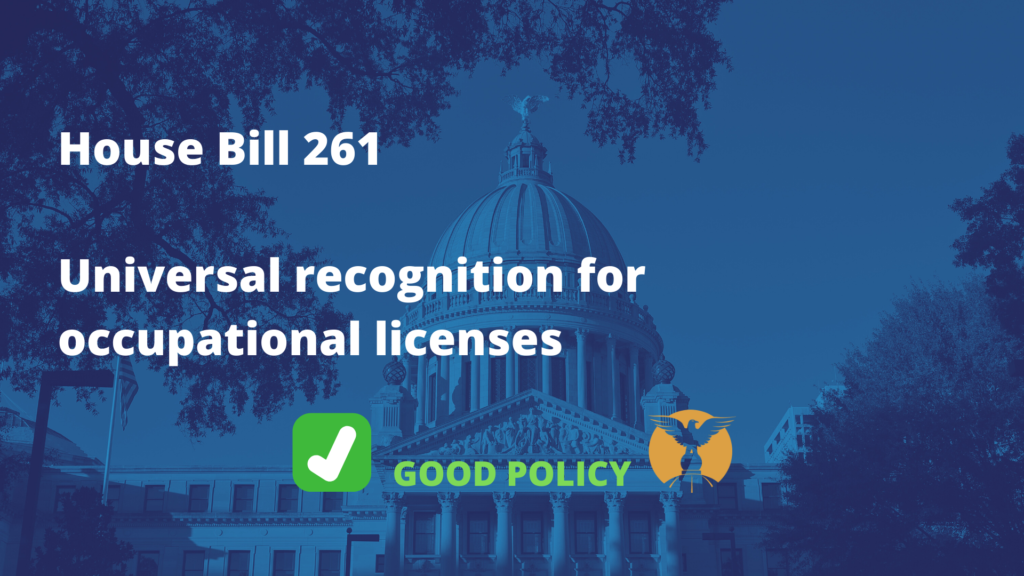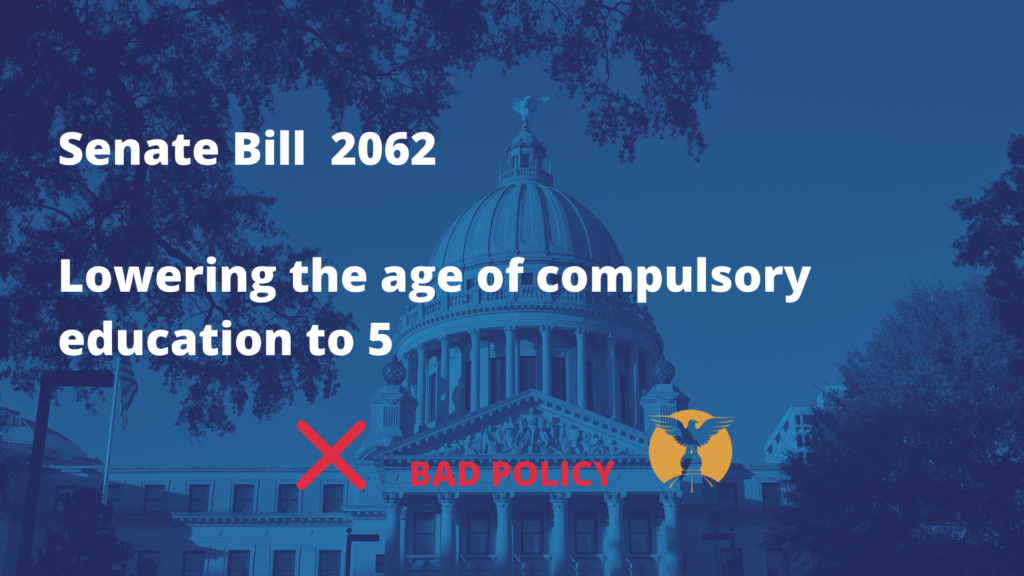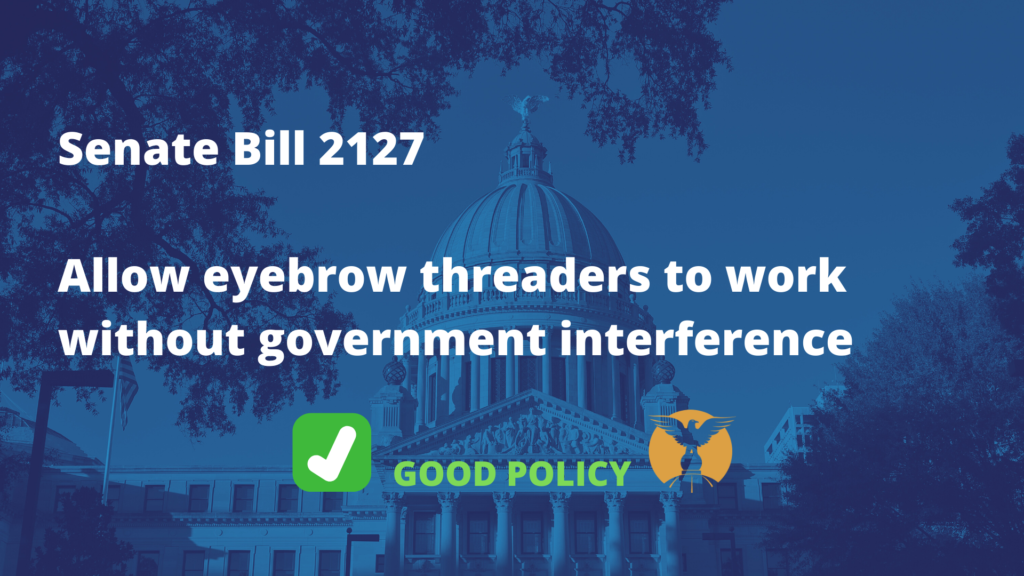House Bill 261, sponsored by Rep. Becky Currie, would allow those holding an occupational license from another state to receive one in Mississippi.

The bill would also allow the spouse of a member of the military who is stationed in Mississippi to receive a license if they hold one from another state.
As of now, a new state resident who is part of a licensed occupation often has to go through the same process as someone receiving their license for the first time with the resultant fees and tests. Also, if the educational requirements for the license in their former state aren’t as stringent, a new resident will have to pay for additional training to make up the difference.
Mississippi does have limited reciprocity agreements with some states with some occupations to honor their licenses, but HB 261 would end this practice and allow most new residents to trade in their former state’s license with a new Mississippi one with little hassle.
A licensee would have to be in good standing with their former state’s regulators and would need to be licensed for a year to be eligible. The new worker would also have to pass a test to determine their knowledge of Mississippi laws and regulations concerning their occupation.
This bill would require the state’s occupational licensing boards would have to adopt rules to implement the new law by January 1, 2021.
In 2019, Arizona became the first state to pass such legislation that allowed new residents in the Grand Canyon State to bring their licenses with them rather than start the process of licensure again.
Mississippi is in need of occupational licensing reform. According to a report by the Institute for Justice, the Magnolia State is ranked 19thworst in the number of lower-income occupations that require a license. The report found that Mississippi licenses 66 out of 102 lower-income occupations studied.
MCPP has reviewed this legislation and finds that it is aligned with our principles and therefore should be supported.
Read the bill here.
Track the status of this bill and all bills in our legislative tracker.
Students, parents, and educators visited the state Capitol on Tuesday to celebrate National School Choice week.
The biggest issue for school choice in Mississippi is the re-authorization of the state’s Education Scholarship Account program, which is set to expire on July 1 without legislative action. A bill to renew the program passed the Senate last year, but died in the House Education Committee without a vote.
John Wells, whose 11-year-old daughter Jalyn is receiving assistance through the ESA program, said she had gone from being non-verbal as a 5-year-old to being an A and B student. The ESA allowed the Wells family to get their daughter a speech therapist and a tutor.
“Parents, we know who knows our children best and that’s us,” Wells said. “We know what they can handle and what they can’t. We’re so thankful for the legislators that voted this through and supplied this and I’m sure there are hundreds of parents throughout the state that are thankful for all of the help they get to educate their children. We really want you to encourage you to speak to your leaders and keep it going and even expand it.
“There’s so much we can do with it. It’s an amazing thing to be able to choose where your children go to school, choose how you live your life with your children because there are so many people who don’t get to have this choice.”
Tamala Boyd Shaw is the founder and executive director of the second charter school, Leflore Legacy Academy, to be opened in the Delta region. She told the crowd that an equitable education is the civil right of the 21stcentury.
The Greenwood school’s application was rejected on the first attempt by the Mississippi Charter Authorizer Board and she thought about giving up before deciding after prayer to redouble her efforts.
Now the school is set to open in time for the next school year. Boyd Shaw said that she’s now interviewing support staff and will hire the teachers next. She also said they’ve found a turnkey building for the school and will start with sixth grade and add a grade every school year until they can start a high school.
“Understanding charter schools and school choice is really more than understanding the differences than traditional public schools,” Boyd Shaw said. “It’s about understanding the needs of students and the desires of parents. I would encourage legislators and others in decision-making seats to dig deeply when thinking about whether they are for or against school choice and think about the children.”
The Mississippi Alcoholic Beverage Control department says they couldn’t possibly handle wine in grocery stores.
Those wishing to purchase wine face a couple major hurdles in Mississippi: Mississippi is one of 17 states that control wine (and liquor) sales and distribution, along with being one of only 11 states that prohibit grocery stores from selling wine.
As is often the case with government-sanctioned and empowered monopolies, the requirement that you must purchase wine from a liquor store has created a strong lobbying force which uses government regulations to protect their entrenched interests.
“Many liquor store owners, though, are afraid allowing wine sales in grocery stores will hurt their business and equally important, cut down on quality choices for customers,” a recent Northside Sun article said. “Tasho Katsaboulas, spokesman for the Mississippi Beverage Merchants Committee, said larger retailers would likely sell the cheaper wines, the same ones that current liquor stores rely on to make ends meet.”
Frankly, our public policy should not be dictated by the whims of any entrenched interests be it business, union, lobby, or otherwise. Our political leaders ought to be seeking to enhance liberty and freedom for the citizens in the market, not restrict certain industries from having to face potential competition.
But along with liquor stores who don’t want the new competition of grocery stores, you also have the state who says they can’t handle that additional volume.
“If you pass wine in grocery stores, I don't know where you would put it,” Department of Revenue Commissioner Herb Frierson recently told members of the state Senate.
According to Frierson, the 211,000 square foot warehouse in Madison that stores wine and liquor is at full capacity, even without Kroger or Walmart being in the market. Keep in mind that it is current government law which mandates that the state control the acquisition and distribution of all alcoholic beverages through one warehouse.
Just as our state policy should not be dictated by the business interests of a certain group, it should not be limited by the ineffectiveness of the government bureaucracy.
If the customers, through the free market prefer to purchase wine through a grocery store, then they should be allowed to do so, and further they should have access to do so without the imposition of government.
Current options on the table involve expanding the existing warehouse which is operating at capacity, decentralizing the process and building warehouses across the state, or privatizing the distribution system.
Ultimately, the state should seek to privatize the system and transfer control of distribution. This would give retailers the ability to work directly with distributors (as they do with everything else they sell in grocery stores), rather than the state, and allow them to make buying choices based on consumer demand, not availability in the state warehouse.
Other states have undergone this privatization process and thus have not only facilitated the empowerment of the free market but have also reduced the existing burden of government operations.
Gov. Tate Reeves said one of his top priorities as governor will be cutting red tape during his first State of the State address tonight.
“Often, the most impactful thing that we can do at this building is get out of the way and allow innovators to thrive,” Reeves said. “That is why one of my priorities will be cutting red tape. We are assembling a team that is committed to ensuring that the people of Mississippi are never held back by cumbersome government. Regulations and processes that may have been well-intentioned, often serve only to slow our state down. We are going to fix that.”
Mississippi has more than 117,000 regulations on the books. These regulations lead to higher costs for consumers, while having a detrimental effect on economic growth.
We now have a history of empirical data on the relationship between regulations and economic growth. A 2013 study in the Journal of Economic Growth estimates that federal regulations have slowed the U.S. growth rate by 2 percentage points a year, going back to 1949. A recent study by the Mercatus Center at George Mason University estimates that federal regulations have slowed growth by 0.8 percent since 1980. If we had imposed a cap on regulations in 1980, the economy would be $4 trillion larger, or about $13,000 per person. Real numbers, and real money, indeed.
“If you are being held back by some unnecessary government rule or process, we will provide an easy way for you to let us know,” Reeves added. “And whenever we can take action, we will do so quickly. We will have a bias towards action. We will listen to the people of Mississippi and clean up our codes to put them first.
“And there’s no question, much of the red tape in government is the result of well-intentioned, but now outdated actions. But do not fool yourself: there are many who use regulation to protect themselves from competition. That must end.”
Mississippi licenses 66 low-and-middle income occupations. This includes everything from a shampooer, who must receive 1,500 clock hours of education, to a fire alarm installer, who must pay over $1,000 in fees.
According to a recent report from the Institute for Justice, Mississippi has lost 13,000 jobs because of occupational licensing and the state has suffered an economic value loss of $37 million.
“We must make it easier for everyone to earn money in Mississippi,” Reeves continued. “That means eliminating those unfair regulations that keep people from getting licenses to work. We must make it simpler for anyone to thrive in our state. As governor, I plan to take a hard look at all of the regulations on the books that make it harder for people to live and work here. If you want to make a living in Mississippi, we want to make it easy for you to live in Mississippi.
“That will be a focus of our administration.”
House Bill 4, sponsored by Rep. Brent Powell, would increase the number of liquor store retail permits that an individual can own from one to three.

Currently, no person, either individually or through a firm, partnership, or LLC, shall own or control interest in more than one permit for liquor stores. This limits a person’s ability to earn a living and run a business, while also limiting competition and consumer choice.
This, however, is just one small part of the state’s desire to regulate, and in many cases, prohibit, legal alcohol sales in the state.
While the internet, technological developments, and more have made the purchase and production of alcohol freer and easier in other states, Mississippi has denied its citizens personal liberty on this issue.
The state has discouraged craft beer production, overregulated alcohol distribution, and cracked down on the ability for citizens to privately produce alcohol. Permits are difficult to secure, and thus many businesses have been left in the dark, unable to expand or operate.
Mississippi could make considerable strides by entrusting in its citizens a greater personal responsibility and freedom when it comes to alcohol sale and production.
There is much the state could do, but this is a step in the right direction.
MCPP has reviewed this legislation and finds that it is aligned with our principles and therefore should be supported.
Read the bill here.
Track the status of this bill and all bills in our legislative tracker.
Senate Bill 2062, sponsored by Sen. Briggs Hopson, and SB 2022, sponsored by Sen. David Jordan, would lower the compulsory education age from 6 to 5 and move the age clock from September 1 to August 1.

Mississippi, like every state in the nation, has compulsory school attendance laws that require a student to be in school, whether public or private, or to be homeschooled, beginning at a certain age and through a certain age, at a minimum.
In Mississippi, the mandatory compulsory age is 6. According to the National Center for Education Statistics, exactly half the states in the country have the same age for compulsory attendance. Even Massachusetts, the father of compulsory education, is 6 years old. Thirteen states set the mandatory age at 7 and two, Pennsylvania and Washington, set it at 8. The remaining ten states, plus the District of Columbia, set the mandatory age at 5 as this proposed bill would do.
The bill would also add this definition to school: “Relative to kindergarten-age children, school shall mean any licensed public, parochial or nonpublic school kindergarten program or legitimate homeschool kindergarten program which promotes services that address the cognitive, social and emotional needs of five-year-old children.”
As we write in Governing By Principle, parents, not the government, are responsible for the education and upbringing of their children. While most families choose to send their children to kindergarten, the decision should be still left to the parents. We should be expanding parental freedoms, rather than expanding the powers of government.
MCPP has reviewed this legislation and finds that it violates our principles and therefore must be opposed.
Track the status of this and all bills in our legislative tracker.
Senate Bill 2127, sponsored by Sen. Angela Hill, will exempt eyebrow threaders from the state’s cosmetology licensure law.

Eyebrow threading is a safe and simple technique that uses just a single strand of cotton thread to remove unwanted hair. It does not involve skin-to-skin contact between the threading artist and customer, does not reuse the same tools on different customers, and does not involve the use of sharp implements, harsh chemicals, or heat.
Currently, eyebrow threaders are required to take at least 600 hours of classes and pass two exams. Yet, not a single hour of classes covers eyebrow threading. Essentially, eyebrow threaders are required to spend thousands of dollars to learn nothing they want to learn and everything they don’t.
The Mississippi Justice Institute, the legal arm of Mississippi Center for Public Policy has filed a lawsuit on behalf of Dip Bhattarai. Bhattarai grew up in Nepal, where threading is a way of life, and learned how to thread at a young age from her family. She came to Mississippi after receiving a scholarship to attend Mississippi University for Women, where she saw an opening in the market for eyebrow threading.
She was pursuing her version of the American Dream, until the state shut her down.
This bill would allow Bhattarai and others earn a living.
MCPP has reviewed this legislation and finds that it is aligned with our principles and therefore should be supported.
Read the bill here.
Track the status of this bill and all bills in our legislative tracker.
In this episode of Unlicensed, Brett and Hunter kick off the legislative session with talk about the desire of the Board of Cosmetology to increase the time it takes to become a nail stylist and the antiquated alcohol policy that is Mississippi. We also discuss the newest members of the Baseball Hall of Fame and whether Curt Schilling is being held back because of his politics.
An autonomous delivery service, otherwise known as a food delivery robot, has arrived at Ole Miss.
The robots, which are a product of Starship Technologies, are in operation at over 100 college campuses, but Ole Miss is the first school in the Southeastern Conference to have the robots, according to the school’s press release. There will be 30 robots serving Ole Miss.
To get your food delivered via a robot, you download the app, place your order, and it can then be delivered to any point on campus by simply dropping a pin in your desired location.
The electric robot looks like a cooler on six wheels, along with lights and a tall orange flag. It combines cameras and artificial intelligence to navigate from beginning to end point.
The app will unlock the lid to access your food. If you tried to steal food from the robot, an alarm will sound, the operator can speak through two-way speakers, and the cameras can photograph the would-be thief.
“We’re honored to be able to help make lives a little bit easier for Rebels across the Ole Miss campus by offering the world’s leading autonomous delivery service” said Ryan Tuohy, senior vice president of business development at Starship. “Whether it’s getting breakfast delivered in the morning or having a late-night snack, our robots are here to serve students, faculty and staff at all times of the day.”
The robots officially debuted Wednesday, January 22.

